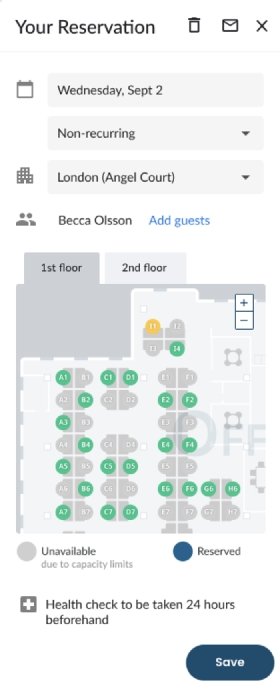
Rymden - stock.adobe.com
Hybrid office brings scheduling software to forefront
Scheduling systems for hybrid offices are an emerging post-pandemic tool to manage employees without permanent desks and facilitate in-person collaboration.
Many firms are moving to hybrid offices and downsizing real estate. Consequently, workers may no longer have an assigned desk or know if their co-workers, team members and managers will be in the office on the same day. For many businesses, this may be a new type of problem and one of the enduring legacies of COVID-19.
But it's a problem with a quickly emerging solution, according to Amy Yin, founder and CEO of OfficeTogether Inc., a New York-based startup formed about a year ago to deal with this issue. What firms need is "shift scheduling for knowledge workers," she said.
And Yin said she sees this type of shift scheduling as a new concept necessitated by the hybrid office.
OfficeTogether designed its scheduling software to make it easier for workers in hybrid offices to collaborate, reserve desks and conference rooms, and find one another using visual maps.
The software uses social media-type tools, enabling people to follow one another and communicate using a Slack channel. Even food vendors can access an application to see if they need to prepare for orders.
OfficeTogether is far from alone in responding to hybrid offices. "Workplace scheduling is not new, but it's very small right now," said Evelyn McMullen, an analyst at Nucleus Research. "I don't think there was much of a need for it prior to the pandemic because hybrid work was rare."

McMullen said she sees an opportunity for workforce management vendors that focus on hourly shift workers to enter this market. "They are well equipped to enter the space," she said. "But regardless of whether or not this happens, I see the market growing as hybrid work becomes the norm."
Workforce management tools
Existing HR vendors are also giving hybrid office scheduling attention. Last month, ServiceNow announced a native mobile application with one-click reservation capability.
ServiceNow said the pandemic accelerated its workplace development efforts, including space and management planning. Employees can book desks, conference rooms with specific room configurations and request food catering through Microsoft calendars, which is synced with the ServiceNow app.
Users want a browser or mobile application that provides "a single click to make a reservation -- it's not any more complicated than that," said Blake McConnell, senior vice president of employee workflow products at ServiceNow. The company recently upgraded its workplace management tools, in part, for this reason.
Josh Bersin, an industry analyst, said office scheduling software is a "huge need" that is getting broad HR vendor adoption.
Scheduling is "becoming a very standard offering, and most of these tools let you schedule desks so the offices don't get too overpopulated and tell people they can't get in if it's too crowded," he said.
But Bersin said he also sees office scheduling as becoming a standard HR platform offering. "From a tech vendor standpoint, it's somewhat of a commodity market," he said.
Machine learning's role in scheduling
Another scheduling software firm, Skedulo Holdings Inc. in San Francisco, which was founded about seven years ago, focuses on "deskless" workers, such as service representatives and healthcare. Its software is now being used for hybrid office scheduling to get the right people and teams in an office environment so they can collaborate, said Matt Fairhurst, its co-founder and CEO. The firm announced last month that it raised $75 million in new funding led by Softbank.
Skedulo said a difference in its product is the use of machine learning "to solve some of the challenges like orchestrating who needs to be where and when," Fairhurst said.
He argued the scheduling software can generate insights into whether people are being overworked, taking too many Zoom calls and not giving themselves enough time for deep thinking, he said.
Hybrid office workers want to be in the office when peers are in the office, and that's something a scheduling system can also address, Fairhurst said. A desire to be in the office with co-workers is one of the "true drivers" to prompt people to go to the office, he said.
Patrick Thibodeau covers HCM and ERP technologies for TechTarget. He's worked for more than two decades as an enterprise IT reporter.







